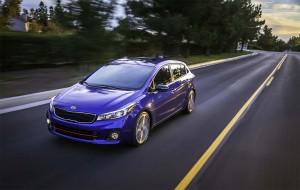
The Kia Forte was No. 1 compact car in the 2016 J.D. Power Initial Quality Study. Kia was also the top brand.
The quality of the typical new vehicle being sold in the U.S. this year is better than ever, according to a new study by J.D. Power and Associates, the pace of improvement increasing at a near-record pace. But that is only one of the surprises found in the 30th annual Initial Quality Study.
Traditionally, Japanese and European luxury brands have dominated the IQS, but not this year. The Power study, which is based on responses from 80,000 U.S. new vehicle owners, found mainstream brands in the lead. In fact, the overall winner of the 2016 Initial Quality Study was Korea’s Kia, with sibling Hyundai nabbing the third spot behind Porsche.
On the whole, the auto industry is “making some of the highest quality products we’ve ever seen,” said Renee Stephens, Power’s vice president of U.S. automotive quality. “What was really fascinating,” she added, was that the score of the typical manufacturer improved by 6%, “double what we saw last year.”
That was all the more significant considering that “automakers are adding so many new features,” such as Bluetooth phone systems, voice-activated navigation, in-vehicle WiFi and other high-tech gear. In recent years, what Power collectively calls Audio, Communication, Entertainment and Navigation, or ACEN, systems have become one of the most frequently cited topic of complaint by new vehicle owners.
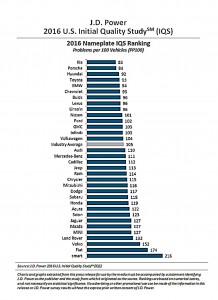 Balky navigation technology is still the number one complaint among buyers, and ACEN issues accounted for a quarter of overall “problems,” as Power calls defects and other issues. By comparison, traditional mechanical problems, such as balky transmissions and faulty engines, have become steadily less common in recent years.
Balky navigation technology is still the number one complaint among buyers, and ACEN issues accounted for a quarter of overall “problems,” as Power calls defects and other issues. By comparison, traditional mechanical problems, such as balky transmissions and faulty engines, have become steadily less common in recent years.
(Domestic car brands carry top spot in total quality impact. For more, Click Here.)
Perhaps the single biggest surprise in the 2016 Power IQS was the ascendancy of the Koreans. A decade ago, noted Stephens, Kia and Hyundai routinely lagged at the bottom of the quality charts. Faced with the prospect of being driven out of the U.S. market, both brands announced extended, 10-year warranties and backed that up by tackling endemic problems. The effort has clearly paid off.
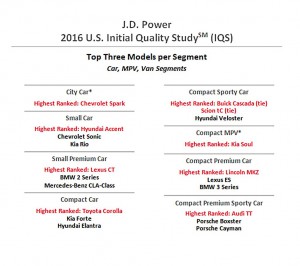 “They’ve just been moving up, up, up,” said Stephens.
“They’ve just been moving up, up, up,” said Stephens.
The two Korean marques still have challenges, the analyst added, noting that “perceptions often lag reality,” and Kia and Hyundai still have to convince buyers they’ve really changed.
More broadly, non-luxury brands made unusually significant gains in quality this past year, according to the Power study. Mainstream marques had a score of 104 Problems-per-100, a measure of how many defects and other issues owners reported for every 100 vehicles. Premium brands average 108 PP100. It was only the second time in 30 years this flip-flop occurred.
Among the Top 10 of the 33 brands included in this year’s IQS, six were mainstream, four premium. Along with the two Koreans, the top ranks included just two European brands – Porsche and fifth-ranked BMW – three Japanese makers and three American marques.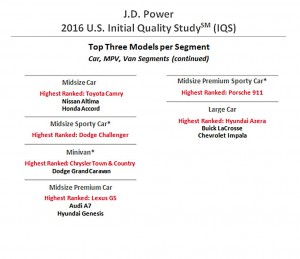
Detroit’s automotive brands posted an especially strong performance, according to Stephens. Among individual product segments, General Motors products led in seven – including such models as the Chevrolet Spark City Car and Chevrolet Silverado Large Light Duty Pickup. Toyota, which was the fourth-ranked brand overall, mustered wins in six categories.
(Click Here for details about Tesla, Kia and Cadillac top customer satisfaction survey.)
Long struggling to get its quality under control, trans-Atlantic Fiat Chrysler Automobiles posted the biggest turnaround in the 2016 IQS, Stephens noted. Its products improved by 13% overall, though the Fiat brand itself still was second-lowest among the 33 marques studied.
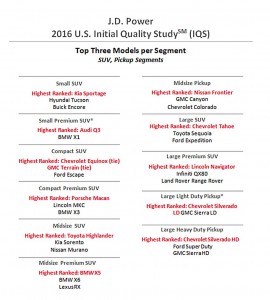 “This is really a great year for Chrysler,” said Stephens. “They’ve moved the needle (though) there’s still more to do.”
“This is really a great year for Chrysler,” said Stephens. “They’ve moved the needle (though) there’s still more to do.”
The automaker issued a statement downplaying the problems of the Fiat brand, noting it had some issues with the launch of its first-ever SUV, the Fiat 500X.
New vehicles launches have often been a problem for manufacturers, and the Smart, Volvo, Land Rover, Mini and Jaguar brands also languished at the back of the IQS pack due to issues involved with the debut of all-new vehicles.
On the other hand, Stephens pointed out that a number of other manufacturers, including GM, have gotten their design and manufacturing operations in order and most of their new products are actually coming to market with better quality than the models they replace.
The 2016 Power IQS looked at the quality of new models after 90 days of ownership. A total of 33 brands and 245 car, truck and crossover models were included. Owners could report any of 233 potential problems.
The impact is more than abstract, according to Stephens, who said, “We find quality has a big influence over the next vehicle an owner purchases.”
(New study sees 21 million autonomous vehicles on the road by 2035. Click Here for the latest.)
The more problems, the more likely a motorist will switch to a new brand.
